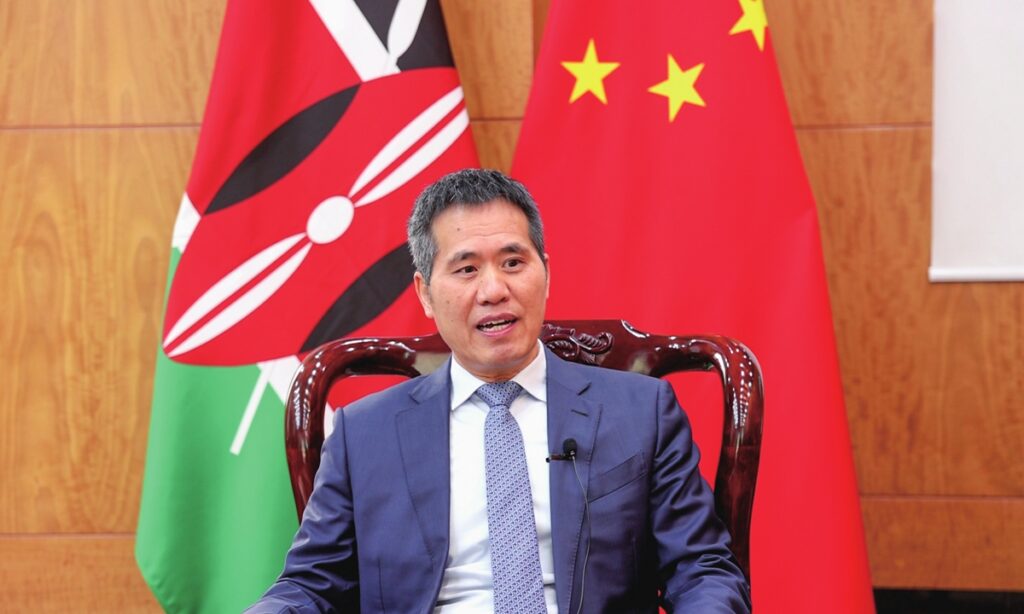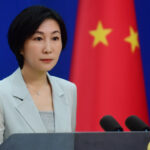Over the last decade, the Belt and Road Initiative (BRI) has yield fruitful achievements and greatly enriched China-Africa relations. As this year marks the 10th anniversary of the proposal of BRI, Global Times reporters Liu Xin and Xing Xiaojing (GT) interviewed Chinese Ambassador to Kenya Zhou Pingjian (Zhou) and Chinese Ambassador to Madagascar Guo Xiaomei (Guo), to learn about their views on the BRI’s achievements in the two African countries and their expectations for future cooperation.
GT: Over the last decade, China and Kenya have achieved fruitful results in their cooperation under the Belt and Road initiative (BRI). What do you see as the biggest highlight?
Zhou: The Mombasa-Nairobi Standard Gauge Railway (SGR) is a landmark project by China and Kenya under the BRI, and it is also an exemplar of many fruitful results. In Kenya, the railway is affectionately called the SGR, and is well-known to almost every single Kenyan. As Kenyan President William Ruto said, the railway has completely changed the national landscape of Kenya.
The BRI has transformed Kenya’s dreams into a reality. The narrow-gauge railway in Kenya was built in 1895 and has long been in disrepair. The country has always wanted to build a standard-gauge railway, which is also a key project in its Vision 2030 plan formulated in 2007.
Since the inauguration of the SGR, it has transported about 11 million passengers and about 28 million tons of cargo. It is worth mentioning that the official name of the railway in Kenya is “Madaraka Express” – “madaraka” means independence in the local Swahili language. Therefore, the most important significance of the railway is to enhance the confidence of the Kenyan people in their own development and make them proud.
GT: How do cooperation projects under the BRI, represented by the SGR, promote the development of other sectors by supporting infrastructure construction in Africa?
Zhou: Infrastructure construction is one of the key focuses of comprehensive cooperation under the BRI, and has unique significance for Kenya.
Kenya itself does not have abundant mineral resources, but its geographical location and regional centrality are very important. Without necessary infrastructure, it cannot consolidate this advantage. That is why Kenya attaches great importance to cooperation with China in building railways, roads, airports, and other forms of infrastructure.
In the construction of these projects, China and Kenya adhere to the principle of extensive consultation, joint contribution, and shared benefits, and implement the concepts proposed by the BRI. Each project effectively addresses Kenya’s development concerns and brings significant benefits, such as creating job opportunities, consolidating regional centrality, and enhancing the confidence of the Kenyan people. No one agrees with the smear of the so-called debt trap.
GT: Based on your understanding, how do people from all walks of life in Kenya respond to the BRI? What role does the initiative play in communicating with the local people?
Zhou: The BRI has an excellent reputation in Kenya, and local friends highly praise the practical changes brought about by China-Kenya cooperation under the initiative.
In 2013, China and Kenya established a comprehensive cooperative partnership of equality, mutual trust, mutual benefit, and win-win cooperation. In 2017, China-Kenya relations were upgraded to a comprehensive strategic cooperative partnership. In the last 10 years, the exchanges between China and Kenya at the head-of-state level have provided strong strategic guidance for the joint construction of the BRI.
In addition to the connectivity of facilities such as the SGR, “soft connectivity” in terms of standard rules and regulations has also been well-coordinated, ensuring smooth trade. A decade ago, the bilateral trade volume between China and Kenya was about $2.8 billion, and in 2022 it reached about $8.5 billion, growing rapidly. The cooperation between the two countries in financial connectivity over the last 10 years has also made great progress.
In the process of jointly building the BRI between China and Kenya, due to the high visibility of projects such as the SGR, the Lamu port, and the Thwake Dam, some people may think that the joint construction mainly focuses on infrastructure.
In fact, the achievements in people-to-people connectivity and cultural exchanges between the two countries are also very prominent. Kenya currently has four Confucius Institutes, the most in any African country. There are also scientific research institutions such as the Sino-Africa Joint Research Center and the Kenya-China Joint Laboratory for Crop Molecular Biology at Egerton University. The embassy staffers always feel enthusiasm when communicating with local people.
GT: We have noticed that many elites in Kenya have a Western education background, but in recent years, more and more young people have tended to opt to study in China. How do you view this change?
Zhou: In Kenya, we hardly hear any negative comments about China. The local people have confidence in China’s development prospects, and naturally want their own future development to be related to China.
Officials from the Kenyan Ministry of Education have expressed that many Kenyan students want to study in China, which also reflects the increasing importance of cooperation with China in Kenya’s consideration of future development. Before visiting China, a high-ranking Kenyan official told me that he needed to bring his 15-year-old son along to let him understand that the world is not only about Europe and America, but also about rapidly developing China.
Kenya is an open country, and both in the business and academic fields, more people are indeed turning their attention to China. The people-to-people exchanges between China and Kenya have laid a solid foundation since the time of Zheng He’s voyages to the coast of East Africa. With the strong driving force of jointly building the BRI, the friendly exchanges between the two countries are expected to deepen further.
GT: While achieving fruitful cooperation with mutual benefits, Western media outlets have intensified their attacks using the so-called debt trap. How do you view this?
Zhou: There are always people who can’t stand others’ success. During our exchanges with local friends in Kenya, no one has agreed with the so-called debt trap insinuation. Even if some people are influenced by such rhetoric, misunderstandings can be eliminated as long as there is clear communication.
A country needs capital for development. If it lacks domestic capital, it needs to find ways to utilize external capital appropriately. Many Kenyans believe that it is good to borrow money to help in development.
As far as I know, the smear of the so-called debt trap lacks credibility in Kenya. China’s financing in Kenya is based on the development projects in the Kenya Vision 2030 plan. Before these projects started, China was not the only country Kenya had contact with. After analyzing different options, Kenya independently chose China. The reason behind this is that Chinese financing brings project implementation and provides Kenya with the fairest and most reasonable financing arrangements within its capacity.
Other speculations such as “neocolonialism” have no standing in Kenya either. My feeling is that when certain media outlets hype such topics, the local media in Kenya reacts minimally because the people here have benefited from pragmatic cooperation under the BRI.
GT: What is the current status of the focus to align the BRI with Kenya’s Vision 2030?
Zhou: The development of each country has different stages, and the demands at each stage are not the same. Any cooperation between China and other countries is based on the needs and absorptive capacity of the partners, as well as the assistance that China can provide, striving for win-win outcomes.
Infrastructure construction remains a priority for Kenya’s national development, and China and Kenya will continue to promote cooperation in this area through innovative approaches. In addition, based on its own development needs, Kenya has a growing desire to cooperate with China in other fields.
For example, the Kenyan government has proposed a bottom-up economic transformation agenda with agriculture at the core, covering areas such as micro, small, and medium-sized enterprises, affordable housing, universal healthcare, and the digital and creative economy. There are broad prospects and ample space for cooperation between Kenya and China in these areas.
Taking the digital and creative economy as an example, China and Kenya have a good foundation for cooperation. Both countries have good cooperation in building 4G and 5G base stations, national fiber optic networks, and national data centers. How to improve and make better use of the infrastructure in these areas is a topic that can be further explored in the future.
There is even greater potential for cooperation between China and Kenya in the tourism industry. More and more Kenyans now recognize that China represents a huge opportunity. They say that China has over 100 million outbound tourists each year, and if even a small fraction of them could come to Kenya, the country’s tourism industry would develop well. Additionally, there is also great potential for cooperation between China and Kenya in the film and television production industry, including animation.
GT: What are your expectations for the development prospects of the high-quality BRI in Kenya?
Zhou: The prospects are very broad. Kenya has its own advantages, and the two countries have gradually explored good methods of cooperation. The most important thing is that both sides adhere to the principles of consultation, joint construction, and shared benefits, aiming for win-win cooperation and promoting their respective development.
Kenya’s leaders, government officials, and ordinary people from all walks of life have highly praised the joint construction of the BRI between China and Kenya.
When the former Kenyan Minister of Transport participated in a live broadcast on a local TV station and was asked why many projects were cooperating with China, he used the example of the SGR to explain how Kenya’s century-old dream became a reality through cooperation with China. He mentioned that they had been talking about building an expressway to the airport for 20 years, and China helped them achieve it within one or two years.
His argument was simple: The projects carried out in cooperation with China are of good quality, cost-effective, and are completed quickly. What’s wrong with that? It also explains, to some extent, why the BRI has borne fruitful results in Kenya. It is because of China’s sincerity and correct concept of righteousness and interests in practical operations, which have helped Kenya achieve its own development.
At the same time, China has also enhanced its own experience, technology, and equipment through cooperation with Kenya, expanding the market for Chinese companies. From August 2008 to July 2011, I served as a counselor at the Chinese Embassy in Kenya. At the time, there was only one Chinese community here, but now there are 18. The number of Chinese tourists visiting Kenya was very small at that time, but before the pandemic, this number had exceeded 80,000.
Looking ahead, I believe that China and Kenya will achieve new breakthroughs in jointly building the BRI and implementing global development initiatives.
(Global Times)




